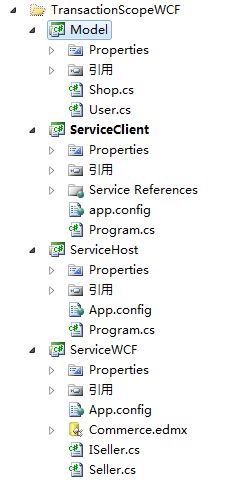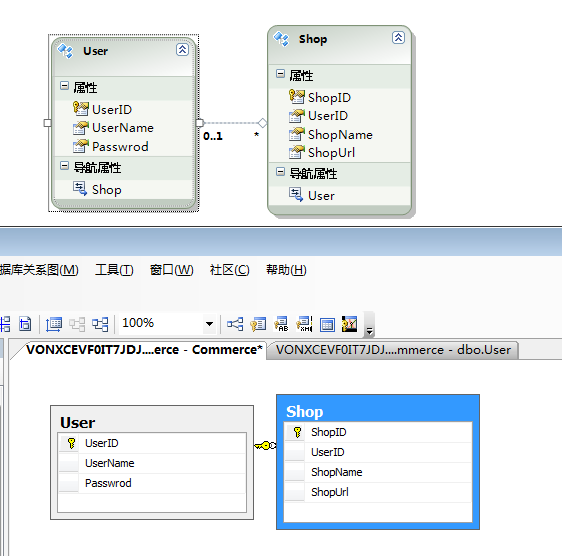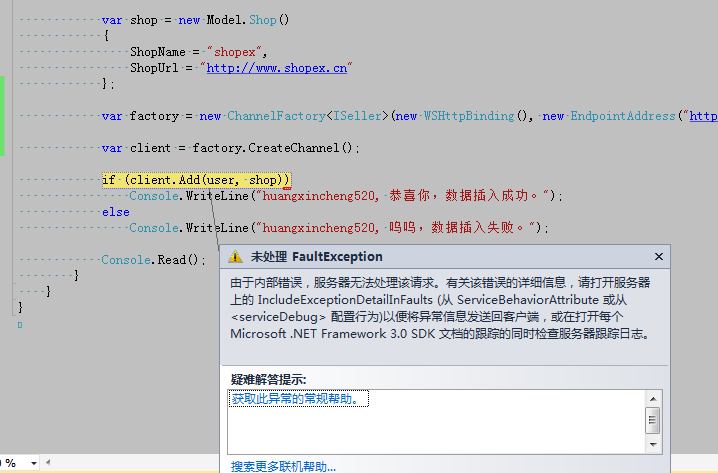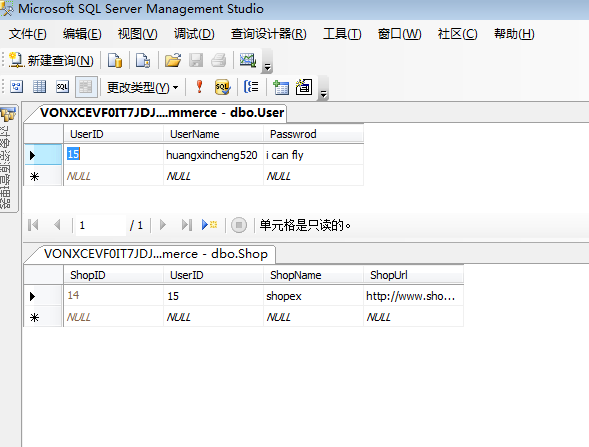今天是速成的第三天,再分享一下WCF中比较常用的一种技术,也就是”事务“。
在B2B的项目中,一般用户注册后,就有一个属于自己的店铺,此时,我们就要插入两张表, User和Shop表。
当然,要么插入成功,要么全失败。
第一步: 首先看一下项目的结构图:
第二步: 准备工作,我们新建Commerce数据库,用EF去映射,然后新建ServiceWCF类库,具体步骤就省略,
这一块不懂可以留言。
第三步:新建一个Model类库。建立两个实体类Shop和User,当然自定义类型在WCF中传输,
必须在类上加上【DataContract】,属性上加【DataMember】。
Shop.cs
1 namespace Model
2 {
3 [DataContract]
4 public class Shop
5 {
6 [DataMember]
7 public int ShopID { get; set; }
8
9 [DataMember]
10 public int UserID { get; set; }
11
12 [DataMember]
13 public string ShopName { get; set; }
14
15 [DataMember]
16 public string ShopUrl { get; set; }
17
18 }
19 }
User.cs
1 namespace Model
2 {
3 [DataContract]
4 public class User
5 {
6 [DataMember]
7 public int UserID { get; set; }
8
9 [DataMember]
10 public string UserName { get; set; }
11
12 [DataMember]
13 public string Password { get; set; }
14 }
15 }
第四步:然后在ServiceWCF类库中新建两个文件Seller.cs 和 ISeller.cs.
ISeller.cs:
1 using System;
2 using System.Collections.Generic;
3 using System.Linq;
4 using System.Runtime.Serialization;
5 using System.ServiceModel;
6 using System.Text;
7
8 namespace ServiceWCF
9 {
10 [ServiceContract]
11 public interface ISeller
12 {
13 [OperationContract(Name = "AddUser")]
14 bool Add(Model.User user, out int userID);
15
16 [OperationContract(Name = "AddShop")]
17 bool Add(Model.Shop shop, out int shopID);
18
19 [OperationContract]
20 bool Add(Model.User user, Model.Shop shop);
21 }
22 }
Seller.cs
1 namespace ServiceWCF
2 {
3 public class Seller : ISeller
4 {
5 ///
6 /// User的插入操作
7 ///
8 ///
9 ///
10 ///
11 public bool Add(Model.User user, out int userID)
12 {
13 using (CommerceEntities db = new CommerceEntities())
14 {
15 try
16 {
17 User userModel = new User()
18 {
19 UserName = user.UserName,
20 Passwrod = user.Password
21 };
22
23 db.User.AddObject(userModel);
24
25 db.SaveChanges();
26
27 userID = userModel.UserID;
28
29 return true;
30 }
31 catch (Exception)
32 {
33 userID = 0;
34 throw;
35 }
36 }
37 }
38
39 ///
40 /// Shop的插入操作
41 ///
42 ///
43 ///
44 ///
45 public bool Add(Model.Shop shop, out int shopID)
46 {
47 using (CommerceEntities db = new CommerceEntities())
48 {
49 try
50 {
51
52 Shop shopModel = new Shop()
53 {
54 ShopName = shop.ShopName,
55 ShopUrl = shop.ShopUrl,
56 UserID = shop.UserID
57 };
58
59 db.Shop.AddObject(shopModel);
60
61 db.SaveChanges();
62
63 shopID = shopModel.ShopID;
64
65 return true;
66 }
67 catch (Exception)
68 {
69 shopID = 0;
70 throw;
71 }
72 }
73 }
74
75 ///
76 /// User,Shop的插入的操作
77 ///
78 ///
79 ///
80 ///
81 [OperationBehavior(TransactionScopeRequired = true, TransactionAutoComplete = true)]
82 public bool Add(Model.User user, Model.Shop shop)
83 {
84 int shopID;
85 int UserID;
86
87 //注意,这个方法操作了两个数据库实例,为AddUser和AddShop。所以晋升为分布式事务
88 if (Add(user, out UserID))
89 {
90 shop.UserID = UserID;
91
92 return Add(shop, out shopID);
93 }
94
95 return false;
96 }
97 }
98 }
TransactionScopeRequired: 告诉ServiceHost自托管服务,进入我的方法,必须给我加上事务。
TransactionAutoComplete: 方法执行中,如果没有抛出异常,则自动提交。
第五步: 新建Host来承载了,配置AppConfig,这些细节就不再说了。
1 using System;
2 using System.Collections.Generic;
3 using System.Linq;
4 using System.Text;
5
6 namespace ServiceHost
7 {
8 class Program
9 {
10 static void Main(string[] args)
11 {
12 System.ServiceModel.ServiceHost host = new System.ServiceModel.ServiceHost(typeof(ServiceWCF.Seller));
13
14 host.Open();
15
16 Console.WriteLine("WCF 服务已经开启!");
17
18 Console.Read();
19 }
20 }
21 }
1 "1.0" encoding="utf-8"?>
2
3
4"true" />
5
6
8
9
10"ServiceWCF.Seller">
11"" binding="wsHttpBinding" contract="ServiceWCF.ISeller">
12
13"localhost" />
14
15
16"mex" binding="mexHttpBinding" contract="IMetadataExchange" />
17
18
19"http://localhost:8732/Seller/" />
20
21
22
23
24
25
26
27
29"True" />
30
33"False" />
34
35
36
37
38
39"CommerceEntities" connectionString="metadata=res://*/Commerce.csdl|res://*/Commerce.ssdl|res://*/Commerce.msl;provider=System.Data.SqlClient;provider connection string="Data Source=VONXCEVF0IT7JDJ;Initial Catalog=Commerce;Integrated Security=True;MultipleActiveResultSets=True"" providerName="System.Data.EntityClient" />
40
41
第六步:开启WCF服务,新建ServiceClient类库,然后用信道生成实例。
1 using System;
2 using System.Collections.Generic;
3 using System.Linq;
4 using System.Text;
5 using System.ServiceModel;
6 using ServiceWCF;
7
8 namespace ServiceClient
9 {
10 class Program
11 {
12 static void Main(string[] args)
13 {
14 var user = new Model.User()
15 {
16 UserName = "huangxincheng520",
17 Password = "i can fly"
18 };
19
20 var shop = new Model.Shop()
21 {
22 ShopName = "shopex",
23 ShopUrl = "http://www.shopex.cn"
24 };
25
26 var factory = new ChannelFactory(new WSHttpBinding(),
new EndpointAddress("http://localhost:8732/Seller/"));
27
28 var client = factory.CreateChannel();
29
30 if (client.Add(user, shop))
31 Console.WriteLine("huangxincheng520, 恭喜你,数据插入成功。");
32 else
33 Console.WriteLine("huangxincheng520, 呜呜,数据插入失败。");
34
35 Console.Read();
36 }
37 }
38 }
最后就是测试了:
首先:走正常流程。client.Add方法调用服务器端,运行效果如图所示:
是的,数据已经正常插入成功,对Client端而言,这个操作是透明的。
然后: 我们在Seller类中的Add方法中故意加入异常。看效果咋样。
1 ///
2 /// User,Shop的插入的操作
3 ///
4 ///
5 ///
6 ///
7 [OperationBehavior(TransactionScopeRequired = true, TransactionAutoComplete = true)]
8 public bool Add(Model.User user, Model.Shop shop)
9 {
10 int shopID;
11 int UserID;
12
13 if (Add(user, out UserID))
14 {
15 //注意注意,我在Adduser成功的情况下,抛出异常,看是否回滚。
16 throw new Exception();
17
18 shop.UserID = UserID;
19
20 return Add(shop, out shopID);
21 }
22
23 return false;
24 }
截图如下:
哈哈,抛出异常了,我的Exception起到效果了,再来看一下数据库。大家都知道会发生什么了,对的,异常不再产生数据了,
还是先前产生了那条数据,说明起到效果了。




